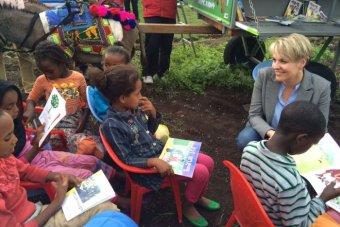Delegates from around the world will meet at a UN development conference in the Ethiopian capital Addis Ababa this week.
They will discuss ways to achieve sustainable development goals, including ending poverty and achieving food security worldwide by 2030.
Foreign Minister Julie Bishop will not be part of Australia’s delegation, but Labor’s foreign affairs spokeswoman Tanya Plibersek will attend the conference in an unofficial capacity.
“The heads of UN agencies cannot understand why a country like Australia would cut $11.3 billion from its aid budget,” Ms Plibersek told the ABC from Addis Ababa.
“And then on the ground, the projects I’ve been visiting, including child and maternal health programs … the people who work at the grassroots of these programs can’t understand either why they’re making decisions about who they are going to stop looking after.”
The Federal Government has cut billions out of the foreign aid budget in the past two years as part of measures to reduce the overall deficit.
The latest cut, delivered in the 2015 budget in May, saw aid to Africa slashed by more than 70 per cent.
One casualty of that decision is the Africa Civil Society Engagement Scheme.
The program partnered with local development groups to focus on child and maternal health, sanitation and agriculture.
In the last five years the Australian Government provided $90 million to the scheme, which was administered by 10 NGOs including Care International and Oxfam.
But funding was not renewed in June, and now the organisers have been pitching the program to other donor countries, saying the continuation of the scheme would benefit a million marginalised people across some of Africa’s poorest countries.
Other aid initiatives are also being shut down.
“We’ve had to restrict and cut a number of our Australian-funded programs in African countries, including one which is actually in Ethiopia in Addis Ababa quite close to the conference itself, one that was focused on young children and supporting parents,” said Plan International’s Programs Australia director, Dave Husy.
Multinational tax avoidance on the agenda
The focus in Addis Ababa this week will not just be on lifting donations from rich countries.
Tax avoidance by multinational companies in the developing world is estimated to cost around $100 billion per year.
“One of the main points of contention between developed and developing countries is this language in the document about a new intergovernmental tax body, which will basically set the norms to help the poorest nations earn more through tax revenues,” said Catherine Woodin, an advocacy advisor attending the conference for Save the Children.
“Some of the large developed countries are opposed to this upgrade, but for us we see changes to international tax cooperation as critical and vital.”
Labor said the Government was on the wrong side of the debate on the issue.
Ms Plibersek accused the Australian delegation of seeking to water down language for a final communique about the issue.
“Australia is now arguing for a weakening of the language around base erosion, profit shifting and tax transparency,” she said.
“It’s beyond belief that we are saying on the one hand that emerging economies need to do more to support themselves to invest in the services they need domestically, and on the other hand we are arguing to make it harder for them to collect the taxes.”
A spokeswoman for the Treasurer said Australia strongly supported global tax reform efforts that address tax avoidance and enhance international transparency, and that the Government continued to support developing countries to strengthen the capability of their tax authorities.
Ms Bishop said her decision not to attend the conference was appropriate.
“There are a number of governments that are represented by appropriate officials and Australia is represented by our most senior official responsible for aid matters,” she said.

